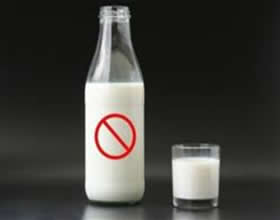Symptoms of lactose intolerance in a patient are usually needed to know by doctors to confirm a diagnosis. In several cases, doctor may also need to perform blood sugar test & hydrogen breath test to make a diagnosis. What is lactose intolerance? And what are the common symptoms that occur in people with this health problem?
You might also like to know more about dairy allergy symptoms and soy allergy symptoms, before continuing!
You might also like to know more about dairy allergy symptoms and soy allergy symptoms, before continuing!
Unfortunately, there is no satisfied result of research to confirm how to treat this disease! In other words, lactose intolerance is still categorized into untreatable disease. But fortunately, if you are diagnosed with this disease, you can still have power to treat the symptoms by avoiding or limiting dairy products.
What is actually lactose intolerance?
As the name suggests, lactose intolerance is a condition when the body is not able to digest lactose properly. What is actually lactose? It is a kind of natural sugar that can be found easily in dairy or milk products.
And when lactose from food that we eat cannot be digested properly and then moves through the colon (large intestine), this condition can lead to uncomfortable signs like bloating, belly pain, and gas. Even some patient with lactose intolerance cannot completely digest any dairy products, while others still able to consume certain types of dairy products in small amounts.
What are lactose intolerance causes?
There is an important enzyme what we call as lactase, and this hormone has important function to support the body to break down and digest lactose. And when the body is no longer to create adequate lactase (produced in small intestine), then the body cannot properly digest lactose -- resulting what we call as lactose intolerance.
What else you should know about causes of lactose intolerance?
- Sometimes, a short-term disease like cystic fibrosis and stomach flu can trigger the small intestine to stop creating lactase. And the problem could be either temporary or permanent in these cases.
- Sometimes, small intestine also can stop creating lactase after certain surgery (particularly a surgery in part of small intestine), which also may cause temporary or permanent lactose intolerance.
- This disease is relatively more common in adults. Some studies found that this disease is also more common in certain decent, like Asian, Native Americans, and Africans. Moreover, it seems less common in European descent than in South American descent.
- There are also newborns with this disease (in very rare cases). An individual born with this disease may not able to consume any foods that contain lactose. But sometimes, lactose intolerance problem in newborns are not easy to diagnose, because there are also some premature newborns with non-permanent lactose intolerance due to they are not yet able to create lactase.
- This disease is also common to run in families. In this case, the symptoms can develop during the teen or adult years. And some people with this kind of lactose intolerance may be still able to consume some types of milk products without having problems.
Symptoms of lactose intolerance
The symptoms can be severe or mild, and may be different from person to person. The signs of lactose intolerance usually occur a half hour to two hours after consuming foods that have lactose. The common symptoms may include; throwing up, gas, pain in the belly (particularly in the lower belly, which usually with or without gurgling sounds), diarrhea, and bloating.
And for individuals born with lactose intolerance, the symptoms may include; difficult to weight gain, dehydration, diaper rash, irritability & weakness, vomiting, and foamy diarrhea!
Overall, the symptoms of this disease are very common signs. Therefore, don’t jump directly to the conclusion. Talk with your doctor to get clearly diagnosis and more advices!
It may be not too big problem if you feel one or some symptoms of lactose intolerance after consuming milk products one time. But if every time you consume dairy products and then you feel those symptoms, you should begin to ask to yourself and see your doctor immediately to get clearly diagnosis.
The last, the biggest challenge in people with lactose intolerance is finding & learning how to choose and eat the right foods that doesn’t contain lactose and also how to get adequate intake of calcium for their body!
-- Image credit to ‘Eskemar via Shutterstock’
Health Tips And Lifestyle
 By
Published: 2012-04-04T22:15:00-07:00
What is Lactose Intolerance (Causes & Symptoms?)
By
Published: 2012-04-04T22:15:00-07:00
What is Lactose Intolerance (Causes & Symptoms?)
 By
Published: 2012-04-04T22:15:00-07:00
What is Lactose Intolerance (Causes & Symptoms?)
By
Published: 2012-04-04T22:15:00-07:00
What is Lactose Intolerance (Causes & Symptoms?)
